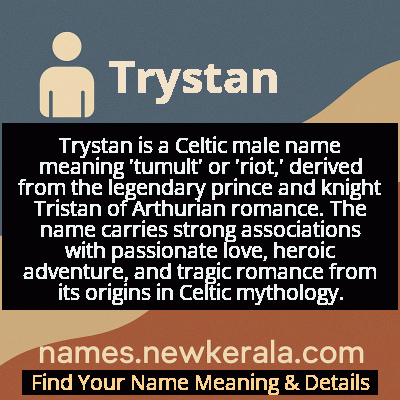Trystan Name Meaning & Details
Origin, Popularity, Numerology Analysis & Name Meaning of Trystan
Discover the origin, meaning, and cultural significance of the name TRYSTAN. Delve into its historical roots and explore the lasting impact it has had on communities and traditions.
Name
Trystan
Gender
Male
Origin
Celtic
Lucky Number
9
Meaning of the Name - Trystan
Trystan is a Celtic male name meaning 'tumult' or 'riot,' derived from the legendary prince and knight Tristan of Arthurian romance. The name carries strong associations with passionate love, heroic adventure, and tragic romance from its origins in Celtic mythology.
Trystan - Complete Numerology Analysis
Your Numerology Number
Based on Pythagorean Numerology System
Ruling Planet
Mars
Positive Nature
Generous, passionate, energetic, and humanitarian.
Negative Traits
Impulsive, impatient, moody, and can be overly emotional.
Lucky Colours
Red, maroon, scarlet.
Lucky Days
Tuesday.
Lucky Stones
Red coral, garnet.
Harmony Numbers
1, 2, 3, 6.
Best Suited Professions
Military, sports, philanthropy, leadership roles.
What People Like About You
Courage, energy, leadership, generosity.
Famous People Named Trystan
Trystan Gravelle
Actor
Welsh actor known for roles in 'Mr. Turner', 'The Terror', and 'The Palace'
Trystan Pütter
Actor
German actor recognized for his work in 'The Baader Meinhof Complex' and 'Counterpart'
Trystan Rhodri
Musician
Welsh folk musician preserving traditional Celtic musical traditions
Name Variations & International Equivalents
Click on blue names to explore their detailed meanings. Gray names with will be available soon.
Cultural & Historical Significance
The cultural significance extends beyond literature into modern interpretations, where the name continues to evoke themes of passionate love, chivalric honor, and the complex interplay between personal desire and social obligation. In Celtic regions, particularly Wales and Cornwall, the name maintains strong regional identity connections, serving as a link to ancient cultural heritage while adapting to contemporary naming practices. The enduring appeal of the Tristan and Iseult legend ensures that the name remains culturally relevant across generations.
Extended Personality Analysis
Individuals named Trystan are often perceived as romantic, passionate, and deeply emotional, reflecting the name's legendary associations with intense love and devotion. They tend to possess a charismatic and adventurous spirit, coupled with a strong sense of loyalty and honor that can sometimes lead them into complex emotional situations. While often creative and artistic in temperament, Trystans may also exhibit a melancholic or introspective side, balancing their outward bravery with inner sensitivity and a tendency toward deep reflection on life's emotional complexities.
These personality characteristics frequently manifest as strong leadership qualities tempered by emotional intelligence, making Trystans effective in roles requiring both decisiveness and empathy. Their natural charm and ability to form deep connections often make them popular among peers, though they may struggle with balancing their idealistic nature against practical realities. The name's association with legendary romance often creates expectations of intensity in relationships, which Trystans typically fulfill through their capacity for deep commitment and emotional expressiveness, though they may also face challenges in maintaining emotional boundaries.
Modern Usage & Popularity
In contemporary naming practices, Trystan maintains a distinctive presence as a Celtic variant of the more common Tristan spelling, appealing to parents seeking traditional roots with unique character. The name enjoys particular popularity in Wales and among families of Celtic descent, where it serves as both a cultural identifier and a nod to legendary heritage. While not among the top-ranking names in most English-speaking countries, Trystan has maintained consistent usage over recent decades, often chosen by parents attracted to its romantic literary associations and strong phonetic qualities. The name's spelling with a 'y' has gained some traction as part of the broader trend toward unique name variations, though it remains less common than the standard Tristan form, preserving its distinctive appeal for those seeking a name that balances tradition with individuality.
Symbolic & Spiritual Meanings
Symbolically, Trystan represents the tension between duty and desire, honor and passion, making it emblematic of the human struggle between societal expectations and personal fulfillment. The name carries connotations of tragic beauty, eternal love, and the idea that great passion often comes with great sacrifice. It symbolizes the romantic ideal of love that transcends social boundaries while acknowledging the potential costs of such devotion. The name also embodies the Celtic cultural values of bravery, loyalty, and emotional depth, serving as a reminder that true heroism encompasses both strength in battle and vulnerability in love. As a symbolic representation, Trystan speaks to the universal human experience of navigating complex emotional landscapes while maintaining personal integrity and honor.

